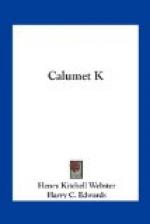Bannon enjoyed his last conversation with Grady, though it left him a good deal to think out afterward. He had acted quite deliberately, had said nothing that afterward he wished unsaid; but as yet he had not decided what to do next. After he heard the door slam behind the little delegate, he walked back into his room, paced the length of it two or three times, then put on his ulster and went out. He started off aimlessly, paying no attention to whither he was going, and consequently he walked straight to the elevator. He picked his way across the C. & S. C. tracks, out to the wharf, and seated himself upon an empty nail keg not far from the end of the spouting house.
He sat there for a long while, heedless of all that was doing about him, turning the situation over and over in his mind. Like a good strategist, he was planning Grady’s campaign as carefully as his own. Finally he was recalled to his material surroundings by a rough voice which commanded, “Get off that keg and clear out. We don’t allow no loafers around here.”
Turning, Bannon recognized one of the under-foremen. “That’s a good idea,” he said. “Are you making a regular patrol, or did you just happen to see me?”
“I didn’t know it was you. No, I’m tending to some work here in the spouting house.”
“Do you know where Mr. Peterson is?”
“He was right up here a bit ago. Do you want to see him?”
“Yes, if he isn’t busy. I’m not the only loafer here, it seems,” added Bannon, nodding toward where the indistinct figures of a man and a woman could be seen corning slowly toward them along the narrow strip of wharf between the building and the water. “Never mind,” he added, as the foreman made a step in their direction, “I’ll look after them myself.”
The moment after he had called the foreman’s attention to them he had recognized them as Hilda and Max. He walked over to meet them. “We can’t get enough of it in the daytime, can we.”
“It’s a great place for a girl, isn’t it, Mr. Bannon,” said Max. “I was coming over here and Hilda made me bring her along. She said she thought it must look pretty at night.”
“Doesn’t it?” she asked. “Don’t you think it does, Mr. Bannon?”
He had been staring at it for half an hour. Now for the first time he looked at it. For ninety feet up into the air the large mass was one unrelieved, unbroken shadow, barely distinguishable from the night sky that enveloped it. Above was the skeleton of the cupola, made brilliant, fairly dazzling, in contrast, by scores of arc lamps. At that distance and in that confused tangle of light and shadow the great timbers of the frame looked spidery. The effect was that of a luminous crown upon a gigantic, sphinx-like head.
“I guess you are right,” he said slowly. “But I never thought of it that way before. And I’ve done more or less night work, too.”
A moment later Peterson came up. “Having a tea party out here?” he asked; then turning to Bannon: “Was there something special you wanted, Charlie? I’ve got to go over to the main house pretty soon.”




